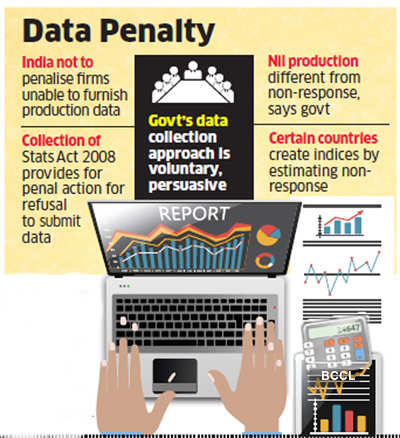New Delhi: India will not invoke a legal provision that empowers the government to penalise companies refusing to submit data for key statistics such as the Index of Industrial Production.
The country’s statistics body did not release headline numbers for Index of Industrial Production (IIP) for April and Consumer Price Index (CPI) for April and May, when India was in a lockdown due to the spread of the Covid-19 pandemic.
As per the Collection of Statistics Act, whoever fails to produce any books of accounts, vouchers, documents or other business records, neglects or refuses to fill in and supply the particulars is punishable with a fine of upto Rs 1,000 or, in the case of a company, with a fine of Rs 5,000.

“This is not the right time to impose penalties as industry is already undergoing a labour and supply chain crisis and many statutory compliances have been delayed,” said an official.
The government, the official said, is grappling with the twin issue of no production and its reporting, and delayed response from those that did produce.
While many firms reported nil production in April, some were not able to report production figures as their offices remained shut due to the nationwide lockdown.
The official said that once that information flows in, the IIP numbers would be revised.
“In India, for the IIP, several establishments reported nil production and these have been taken as such and not treated as a non-response. Collection of data in India has been more focused towards a persuasive approach rather than a legalistic approach,” Pravin Srivastava, chief statistician and secretary, ministry of statistics and programme implementation, told ET.
India’s industrial production shrank a record 55.5% on year in April as computed from data released by the government, which didn’t provide a number for the change from April 2019 because of the Covid-19 lockdown.
The estimates for April were compiled at a weighted response rate of 87%, the ministry said, adding that these estimates should not be compared with those of succeeding and earlier months to assess how the economy is reviving.
For IIP, the National Statistical Office uses secondary data received from 14 source agencies in various ministries and covers 407 item groups.
Retail inflation price data for April, which saw a more stringent lockdown, was collected through telephonic enquiry and supplemented by information collected during the personal purchase of field staff from 674 urban markets and 524 villages. It is usually based on prices from 1114 selected urban and 1181 villages through personal visits by field staff.
Comparing India’s approach to lack of data with other countries, Srivastava said: “In compilation of indices, non-response from establishments on account of disruption is usually estimated based on past data/performance.”
Srivastava said certain countries have rigidities built into their software design that do not address a global pandemic type situation or a nation-wide lockdown.
“Indices in these countries are generated by estimating non-response as if the economy is in a normal situation”, he said.
As per former chief statistician Pronab Sen, imposition of penalty should be avoided so as to reduce chances of data manipulation by the reporting firms.
“What is required is the ability of offices concerned to be able to submit the required data. There have been delays in submitting data and that is where a chance of revision lies going ahead,” Sen added.
He explained that many countries have a mandatory data submission policy in the absence of which, companies can be penalised.
“India has so far refrained from using this practice and prefers voluntary submission of data,” he said.
Source : PTI
